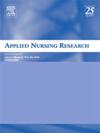工作家庭平衡对中国重症监护室护士自我效能感和主观幸福感的影响:一项横断面研究
IF 2.2
4区 医学
Q1 NURSING
引用次数: 0
摘要
icu护士经常面临工作时间长、工作强度高、医疗责任重、24小时轮班和相对封闭的工作环境。这一职业的高风险、高强度、高压力的性质可能促使护士考虑辞职,最终导致护理人员严重短缺,对护士的健康和福祉产生不利影响。有必要对影响护士主观幸福感的因素及各因素之间的相互关系进行全面调查,从而为更有针对性地提高护士主观幸福感的干预方案奠定理论基础。方法采用STROBE标准的横断面设计。选择四所三级综合医院的247名ICU护士进行在线调查。衡量标准包括自我效能、工作与家庭平衡和主观幸福感。结果自我效能感对护士工作家庭平衡和主观幸福感有显著影响。工作家庭平衡在自我效能感与主观幸福感之间起中介作用。中介分析显示,自我效能感对主观幸福感有显著的整体影响(β = 0.758, p <;0.01)。此外,自我效能感对主观幸福感有直接影响(β = 0.575, p <;0. 01),工作家庭平衡(β = 0.458, p <;0. 01),工作家庭平衡对主观幸福感有直接影响(β = 0.399, p <;0.01)。结论ICU护士自我效能感与主观幸福感呈中等水平正相关。提示提高ICU护士的自我效能感和工作与家庭的平衡有助于提高其主观幸福感水平。本文章由计算机程序翻译,如有差异,请以英文原文为准。
Work-family balance mediates self-efficacy and subjective well-being among nurses in Chinese intensive care units: A cross-sectional study
Background
ICU nurses frequently confront lengthy working hours, elevated job intensity, heavy medical responsibilities, round-the-clock shifts, and a comparatively closed working environment. The high-risk, high-intensity, high-stress nature of the profession may prompt nurses to consider resignation, culminating in a significant shortage of nursing staff, adversely affecting the health and well-being of nurses. Necessitating a comprehensive investigation into the factors influencing their subjective well-being and the interrelations among these factors, thereby establishing a theoretical foundation for a more focused intervention program aimed at enhancing the subjective well-being of nurses.
Methods
This study employed a cross-sectional design in accordance with STROBE criteria. Two hundred forty-seven ICU nurses from four tertiary general hospitals were intentionally chosen to take an online survey. Metrics encompassed self-efficacy, work-family balance, and subjective well-being.
Results
The findings demonstrated that self-efficacy strongly influenced nurses' work-family balance and subjective well-being. The work-family balance served as a mediating factor in the association between self-efficacy and subjective well-being. Mediation analysis indicated a substantial overall influence of self-efficacy on subjective well-being (β = 0.758, p < 0.01). In addition, self-efficacy had a direct effect on subjective well-being (β = 0.575, p < 0. 01), on work-family balance (β = 0.458, p < 0. 01), and work-family balance had a direct effect on subjective well-being (β = 0.399, p < 0.01).
Conclusion
This study found that among nurses in ICU have moderate levels of self-efficacy and subjective well-being, which are positively correlated. This suggests that improving the self-efficacy and work-family balance of ICU nurses may help enhance their subjective well-being levels.
求助全文
通过发布文献求助,成功后即可免费获取论文全文。
去求助
来源期刊

Applied Nursing Research
医学-护理
CiteScore
4.50
自引率
0.00%
发文量
65
审稿时长
70 days
期刊介绍:
Applied Nursing Research presents original, peer-reviewed research findings clearly and directly for clinical applications in all nursing specialties. Regular features include "Ask the Experts," research briefs, clinical methods, book reviews, news and announcements, and an editorial section. Applied Nursing Research covers such areas as pain management, patient education, discharge planning, nursing diagnosis, job stress in nursing, nursing influence on length of hospital stay, and nurse/physician collaboration.
 求助内容:
求助内容: 应助结果提醒方式:
应助结果提醒方式:


